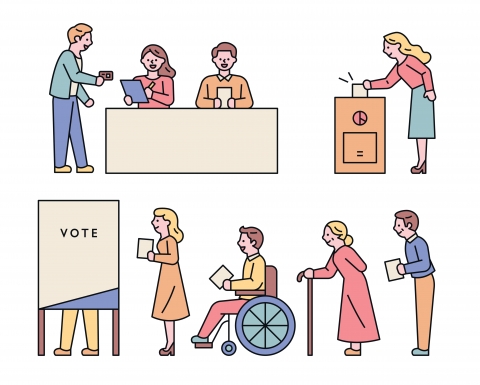European Economic
and Social Committee
Voting rights of persons with disabilities: EESC demands a change in the EU electoral law
The EESC finds it unacceptable and contrary to EU fundamental values that, due to legal and technical barriers still in place across Europe, not a single EU country is able to guarantee that elections are fully accessible to all
The European Economic and Social Committee (EESC) is calling on the European Parliament (EP), the Council of the EU and Member States to urgently amend the 1976 Electoral Act in a way that guarantees that all EU citizens with disabilities have a genuine right to vote in the EP elections in 2024.
In its opinion on The need to guarantee real rights for persons with disabilities to vote in European Parliament elections, adopted on 2 December, the EESC said it was asking for the principles of universality, secrecy and directness to be clarified in the text of the Act.
This would put a stop to discrimination against voters with disabilities linked to current rules or arrangements in different Member States, which differ considerably from one country to another. It could also remove legal or technical barriers currently in place, depriving millions of their voting rights.
The EESC considers such discrimination to be unacceptable and contrary to the fundamental values of the EU, to the Treaty and to major international legal and political acts
, said the rapporteur for the opinion Krzysztof Pater.
The opinion was adopted at the EESC's latest plenary session, at which disability issues took centre stage, to mark the 2020 International Day of Persons with Disabilities, celebrated globally on 3 December. The opinion is a follow-up to the EESC's 2019 information report.
First of all, this opinion is about human dignity. What we are asking has to do with the principle of equal rights for all. How is it possible that in the 21st century, millions of EU citizens with disabilities cannot enjoy their right to vote and decision-makers do almost nothing to change that? This is a key issue for EU democracy
, Mr Pater stressed.
Mr Pater said he hoped that people with disabilities would not see the same fate as European women, who saw the last restriction on their voting rights in the present EU lifted as late as 1976, 70 years after Finland became the first country in Europe to admit women to its polling stations.
The EESC warned that if no legal changes were made, the number of citizens potentially deprived of this right would continue to steadily rise, as the share of people with some sort of disability in the rapidly ageing EU population increases by one percent every six years on average.
Voting rights are also denied to people undergoing short-term care in hospital, those in the process of treatment or rehabilitation at home or those in isolation due to epidemiological risks.
EESC's 2019 report pointed to discrimination against voters with disabilities
The EESC's 2019 report, authored by Mr Pater, listed in detail the limitations and barriers faced by voters with disabilities in each Member State. It also listed 200 examples of solutions, which exist in each country.
The findings of the report, published two months prior to the 2019 EP elections, were later confirmed by the election reports from the media and civil society organisations.
Despite some positive changes in French and German national laws immediately before the EP elections, it was established that the national laws of 14 countries still excluded some 400 000 citizens from voting on the grounds of mental health problems or intellectual disabilities. Persons with disabilities unable to vote due to organisational or technical arrangements arising from national rules could be counted in millions.
For example, according to the report, in eight EU countries, people who cannot physically come to the polling station due to disability or illness have no other way to vote. In 18 countries, visually impaired people cannot vote independently and in nine countries voters have to write the identification number of the candidate, their name or the name of the party they are supporting on the ballot paper, which is a serious barrier for many.
Action proposed by the EESC
In the EESC's view, existing practices that discriminate against EU citizens with disabilities can be quickly removed by amending the Electoral Act in a way that makes it mandatory for EU countries to implement standards that would guarantee that these people have a genuine right to vote.
To that end, the EESC is calling for the principle of universal suffrage set out in the Electoral Act to be clarified, by including a statement stipulating that no EU citizen may be deprived of their right to vote in EP elections because of a disability or health condition on the basis of national regulations.
The principles of the directness and secrecy of the elections referred to in the Act should also be clarified. The EESC suggests a set of six of measures that EU countries should take to ensure these principles are respected when it comes to voting by all citizens including persons with disabilities.
The EESC thinks that the EU could tap into the positive experiences of many countries to implement the proposed solutions.
If all these rules are implemented, the 2024 EU elections will be truly universal and accessible to all. This is our goal. It could mark a new era for disability rights in Europe
, Mr Pater concluded.
